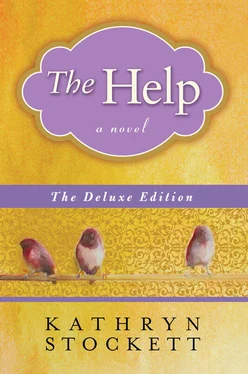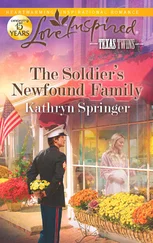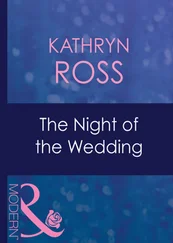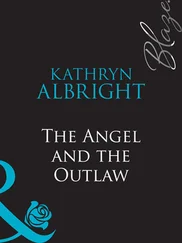“And I could see how people would take it, think you’re some kind of crazy liberal, involved in all that mess.”
I study my hands, still wary of what he might have heard, and a little irritated too. “How do you know,” I ask, “what I’m involved in?”
“Because I know you, Skeeter,” he says softly. “You’re too smart to get mixed up in anything like that. And I told them, too.”
I nod, try to smile. Despite what he thinks he “knows” about me, I can’t help but appreciate that someone out there cares enough to stand up for me.
“We don’t have to talk about this again,” he says. “I just wanted you to know. That’s all.”
ON SATURDAY EVENING, I say good night to Mother. I have a long coat on so she can’t see my outfit. I keep the lights off so she can’t comment on my hair. Very little has changed with her health. She doesn’t seem to be getting any worse—the vomiting is still at bay—but her skin is grayish white. Her hair has started to fall out. I hold her hands, brush her cheek.
“Daddy, you’ll call the restaurant if you need me?”
“I will, Skeeter. Go have some fun.”
I get in Stuart’s car and he takes me to the Robert E. Lee for dinner. The room is gaudy with gowns, red roses, silver service clinking. There is excitement in the air, the feeling that things are almost back to normal since President Kennedy died; 1964 is a fresh, new year. The glances our way are abundant.
“You look . . . different,” Stuart says. I can tell he’s been holding in this comment all night, and he seems more confused than impressed. “That dress, it’s so . . . short.”
I nod and push my hair back. The way he used to do.
This morning, I told Mother I was going shopping. She looked so tired though, I quickly changed my mind. “Maybe I shouldn’t go.”
But I’d already said it. Mother had me fetch the big checkbook. When I came back she tore out a blank check and then handed me a hundred-dollar bill she had folded in the side of her wallet. Just the word shopping seemed to’ve made her feel better.
“Don’t be frugal, now. And no slacks. Make sure Miss LaVole helps you.” She rested her head back in her pillows. “She knows how young girls should dress.”
But I couldn’t stand the thought of Miss LaVole’s wrinkled hands on my body, smelling of coffee and mothballs. I drove right through downtown and got on Highway 51 and headed for New Orleans. I drove through the guilt of leaving Mother for so long, knowing that Doctor Neal was coming by that afternoon and Daddy would be home all day with her.
Three hours later, I walked into Maison Blanche’s department store on Canal Street. I’d been there umpteen times with Mother and twice with Elizabeth and Hilly, but I was mesmerized by the vast white marble floors, the miles of hats and gloves and powdered ladies looking so happy, so healthy . Before I could ask for help, a thin man said, “Come with me, I have it all upstairs,” and whisked me in the elevator to the third floor, to a room called MODERN WOMEN’S WEAR.
“What is all this?” I asked. There were dozens of women and rock-and-roll playing and champagne glasses and bright glittering lights.
“Emilio Pucci, darling. Finally!” He stepped back from me and said, “Aren’t you here for the preview? You do have an invitation, don’t you?”
“Um, somewhere,” I said, but he lost interest as I faked through my handbag.
All around me, clothes looked like they’d sprouted roots and bloomed on their hangers. I thought of Miss LaVole and laughed. No easter-egg suits here. Flowers! Big bright stripes! And hemlines that showed several inches of thigh. It was electric and gorgeous and dizzying. This Emilio Pucci character must stick his finger in a socket every morning.
I bought with my blank check enough clothes to fill the back seat of the Cadillac. Then on Magazine Street, I paid forty-five dollars to have my hair lightened and trimmed and ironed straight. It had grown longer over the winter and was the color of dirty dishwater. By four o’clock I was driving back over the Lake Pontchartrain bridge with the radio playing a band called the Rolling Stones and the wind blowing through my satiny, straight hair, and I thought, Tonight, I’ll strip off all this armor and let it be as it was before with Stuart.
STUART AND I eat our Chateaubriand, smiling, talking. He looks off at the other tables, commenting on people he knows. But no one gets up to tell us hello.
“Here’s to new beginnings,” Stuart says and raises his bourbon.
I nod, sort of wanting to tell him that all beginnings are new. Instead, I smile and toast with my second glass of wine. I’ve never really liked alcohol, until today.
After dinner, we walk out into the lobby and see Senator and Missus Whitworth at a table, having drinks. People are around them drinking and talking. They are home for the weekend, Stuart told me earlier, their first since they moved to Washington.
“Stuart, there are your parents. Should we go say hello?”
But Stuart steers me toward the door, practically pushes me outside.
“I don’t want Mother to see you in that short dress,” he says. “I mean, believe me, it looks great on you, but . . .” He looks down at the hemline. “Maybe that wasn’t the best choice for tonight.” On the ride home, I think of Elizabeth, in her curlers, afraid the bridge club would see me. Why is it that someone always seems to be ashamed of me?
By the time we make it back to Longleaf, it’s eleven o’clock. I smooth my dress, thinking Stuart is right. It is too short. The lights in my parents’ bedroom are off, so we sit on the sofa.
I rub my eyes and yawn. When I open them, he’s holding a ring between his fingers.
“Oh . . . Jesus.”
“I was going to do it at the restaurant but . . .” He grins. “Here is better.”
I touch the ring. It is cold and gorgeous. Three rubies are set on both sides of the diamond. I look up at him, feeling very hot all of a sudden. I pull my sweater off my shoulders. I am smiling and about to cry at the same time.
“I have to tell you something, Stuart,” I blurt out. “Do you promise you won’t tell anyone?”
He stares at me and laughs. “Hang on, did you say yes?”
“Yes, but . . .” I have to know something first. “Can I just have your word?”
He sighs, looks disappointed that I’m ruining his moment. “Sure, you have my word.”
I am in shock from his proposal but I do my best to explain. Looking into his eyes, I spread out the facts and what details I can safely share about the book and what I’ve been doing over the past year. I leave out everyone’s name and I pause at the implication of this, knowing it’s not good. Even though he is asking to be my husband, I don’t know him enough to trust him completely.
“This is what you’ve been writing about for the past twelve months? Not . . . Jesus Christ?”
“No, Stuart. Not . . . Jesus.”
When I tell him that Hilly found the Jim Crow laws in my satchel, his chin drops and I can see that I’ve confirmed something Hilly already told him about me—something he had the naïve trust not to believe.
“The talk . . . in town. I told them they were dead wrong. But they were . . . right.”
When I tell him about the colored maids filing past me after the prayer meeting, I feel a swell of pride over what we’ve done. He looks down into his empty bourbon glass.
Then I tell him that the manuscript has been sent to New York. That if they decide to publish it, it would come out in, my guess is, eight months, maybe sooner. Right around the time, I think to myself, an engagement would turn into a wedding.
“It’s been written anonymously,” I say, “but with Hilly around, there’s still a good chance people will know it was me.”
Читать дальше












